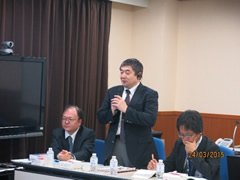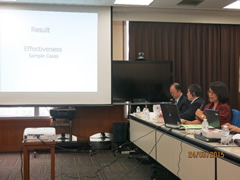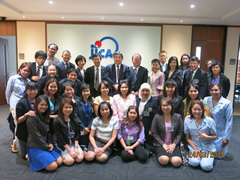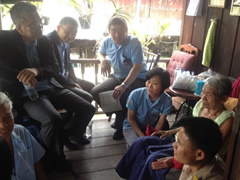- Home
- Technical Cooperation Projects
- Index of Countries
- Asia
- Thailand
- The Project of Long-Term Care Service Development for the Frail Elderly and Other Vulnerable People
- Project News
- The result of 1st Monitoring and Evaluation Survey on Effectiveness of LTOP model services was reported at the LTOP seminar
Project News
2015-03-24
The result of 1st Monitoring and Evaluation Survey on Effectiveness of LTOP model services was reported at the LTOP seminar
From January till March 2015, the LTOP Survey team visited 6 project sites to monitor and evaluate the effectiveness of LTOP model services for the 1st time. On the 24th March 2015, the result was shared by the team at the LTOP seminar.
At the meeting room of JICA Thailand office, 23 Thai participants from Ministry of Public Health, Ministry of Social Development and Human Security, Bangkok site and Nonthaburi site joined. From Japan side, 13 persons from Ministry of Health, Labour and Welfare, Embassy of Japan in Thailand, JICA Headquarter and Thailand office etc joined. In total, 36 Thai and Japanese participants gathered for the LTOP Seminar.
Ms. Parichart, the main survey team member from MOPH shared the basic data gained from 6 project sites (current service implementation, allowance for Care Workers etc) and the result focusing on the ADL improvement of elderlies by the introduction of Care Plan. The participants shared various suggestions/opinions to improve further LTOP survey during discussion.
1st LTOP Survey on Effectiveness, at a glance
| Site/Survey Schedule | Elderly no. | Care Giver no. | Care Manager no. | Care Worker no. |
|---|---|---|---|---|
| Nakhon Ratchasima(22nd-23rd Jan) | 23 | 23 | 3 | 14 |
| Nonthaburi (3rd-4th Feb) | 32 | 32 | 4 | 7 |
| Bangkok (12th-13th Feb) | 18 | 18 | 4 | 14 |
| Chiang Rai(17th-18th Feb) | 29 | 29 | 5 | 31 |
| Surat Thani(27th Feb) | 16 | 16 | 6 | 13 |
| Khon Kaen(4th-5th Mar) | 27 | 27 | 4 | 5 |
There were some major opinions/suggestions raised by the audience, as below;
1. Additional Perspectives (Towards policy recommendations)
- Detailed Questions to Care Managers/Care Workers
- Issues of Sustainability
- Economical/Cost perspectives
→ Can Care Workers look after more cases than before? Or can they look after each case with more time? Can we ask such questions on operational efficiency by the LTOP/Care Plan intervention? (Japan)
→ How much service contents in Care Plans Care Workers can actually perform?/Is there any additional knowledge or skill Care Workers need? (Thai)
→ One of the most important thing we should standardize is to define the clear meaning and roles of the Care Managers/Care Workers in Thailand. (Thai)
→ How to keep the great volunteer system in Thailand while introducing paid/unpaid professional Care Managers and Care Workers compatibly? (Japan/Thai)
→ The suggestion of establishing guidelines for volunteers in providing care and services (Thai)
→ Can we collect information of potential Care Workers who may contribute to services in future? (Japan)
→ The effectiveness of Care Plan which led to ADL improvement should be followed in the next survey as well (Japan)
→ Is there any difference between Khon Kaen site which introduced the allowance for Care Workers and other sites?/Can we collect information from family Care Givers how much they are willing to pay to receive current services?/ Can we compare the costs of care provided by family member and the services provided by Care Workers?/ Can the Care Giver gain more income if elderly is taken care by the Care Workers? (Thai)
→ They are very important perspectives, but the introduction and analysis of the economical/commercial perspectives could be later on (Japan)
2. How to show result attractively (To improve persuasiveness)
- Show the comparative data from each site/Differences between Rural-Urban area (Thai/Japan)
- Visualize the frequency of home help by Care Workers and ADL improvement (Thai)
- It must be necessary to find out the best practices of each pilot sites to show the success factors for the result dissemination in the future. (Thai)
- In the new care system in Thailand, I think it is truly important to recognize the role of family Care Givers or volunteers. Is it possible to show the roles of family Care Givers quantitatively? For example, is it possible to show the data of family contribution on ADL improvement quantitatively? (Japan)
- Show the medical condition or the reason why the elderly becomes dependent to prevent others entering to long term care state(Thai)
Other opinions
- The factors contributed to ADL improvement (in addition to Care Plan) should be analyzed deeper. Due to any specific service? Or Power of family Care Giver? Or Care Workers? (Thai/Japan)
- It must be useful to analyze some failing cases to find out why the case was not successful by Care Plan. (Thai)
In the seminar, the other project activities were reflected and future activities including the contents of future training in Japan were also discussed. One of the future main activity is the Japan training and the topic was discussed interestingly at the seminar as well. The LTOP Project will continue activities further based on various opinions gained through this seminar.
 Opening speech by Mr. Ozuru, MHLW
Opening speech by Mr. Ozuru, MHLW
 Ms. Parichart, MOPH shares the result of survey
Ms. Parichart, MOPH shares the result of survey
 Group Photo
Group Photo
 Visit to Nonthaburi site (23rd, the previous day of seminar)
Visit to Nonthaburi site (23rd, the previous day of seminar)
- About JICA
- News & Features
- Countries & Regions
- Our Work
- Thematic Issues
- Types of Assistance
- Partnerships with Other Development Partners
- Climate Change / Environmental and Social Considerations
- Evaluations
- Compliance and Anti-corruption
- Science and Technology Cooperation on Global Issues
- Research
- JICA Development Studies Program / JICA Chair
- Support for the Acceptance of Foreign HRs / Multicultural and Inclusive Community
- Publications
- Investor Relations
